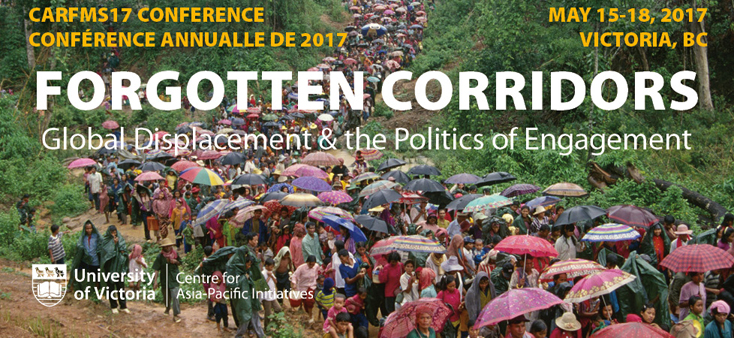- Fall Newsletter, 2025, Issue 15
- Using International Online Learning Modules to Engage Students in the Study of Critical Global Issues
- Upcoming Book Launch: Hearts of Freedom
- Announcing winners of the 2025 CARFMS Essay Contest
- The New York Declaration for Refugees and Migrants and its two Global Compacts: Addressing the Symptoms or the “Root Causes” of Forced Displacement?*
About the 2017 Conference
CARFMS 2017
10th Annual Conference of the Canadian Association for Refugee and Forced Migration Studies
Hosted by the Centre for Asia-Pacific Initiatives’ Migration and Mobility Program, University of Victoria
Never before in modern history have so many people been forced to leave their homes and journey abroad for temporary or permanent settlement. According to the UNHCR Mid-Term June 2015 report, “by the end of 2015, 65.3 million individuals were forcibly displaced worldwide as a result of persecution, conflict, generalized violence or human rights violations.”
Much attention in the west has been directed at the steady flow of refugees leaving war-torn countries to end up on the shores of the Mediterranean. However, many of the displaced remain neglected or forgotten; travelling little watched corridors en route to temporary destinations in detention centers, refugee camps, or makeshift housing. These hierarchies of human mobility hide the precarious nature of the lives of millions of migrants, demanding attention and engagement to make meaningful transformations.
The Centre for Asia-Pacific Initiatives at the University of Victoria will host the tenth annual CARFMS conference from May 15th to 18th, 2017 in beautiful Victoria, BC. CARFMS17 will invite researchers, policy makers and activists from diverse disciplines and regions to discuss the parameters of global displacement, especially the experiences of those taking routes less traveled. We especially encourage filmmakers or producers to submit video documentaries.
This conference was supported by the Social Sciences and Humanities Research Council of Canada.

